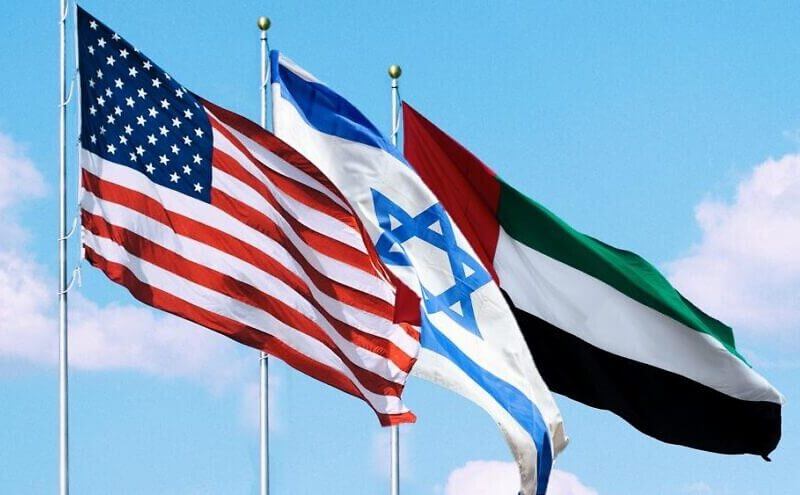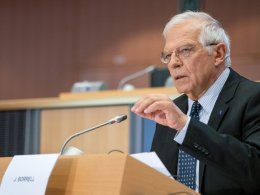As talks on reviving the 2015 Joint Comprehensive Plan of Action (JCPOA) seem to be ending, there are overt concerns from neighboring countries about the deal and its provisions.
The deal, which will likely be announced in coming days, will allow for oil waiver of Iranian oil exports, unfreeze Iran’s monetary assets overseas, and desperately try to suspend Iran’s uranium enrichment. While the U.S. and European officials seem confident and content with the soon-to-be-revived agreement, countries close to Iranian proximity, such as Israel and the United Arab Emirates (UAE), have raised national security concerns, demanding guarantees from the West against the mullahs.
Israel and the United Arab Emirates (UAE), countries that once had no friendly relationships with one another, are now fully united together thanks to the common fear of the Islamic Republic's radical Islamic vision of the Middle East. Members of the Iranian government, ranging from military officials, presidents, and the Supreme Leader, have vowed to wipe Israel and its allies off the face of the map.
Issues such as uranium enrichment and nuclear inspection are critical concerns for Israel and the UAE in the soon-to-be-revived JCPOA, but the possibility of granting Iranian oil waivers and unfreezing effects immediate security concerns.
The latest nuclear agreement allows for the exportation of Tehran's oil supply into the international market, generating massive revenue for the Iranian government. The oil revenue generated from Tehran allows the Iranian regime to fund Islamic terrorist groups close to Israel and friendly neighboring Arab states such as Hamas in Gaza, Hezbollah in Lebanon, the Muslim Brotherhood in Egypt, the Houthis in Yemen, and many others. The agreement also includes a measure to unfreeze billions of Iranian monetary assets overseas, allowing the regime to finance Iran's Revolutionary Guard Corps (IRGC) and Iranian-backed terrorist entities.
In the past, officials of the Islamic Republic have continually stated that its nuclear program is for civilian and not military use. In past months, the Islamic Republic has enriched its uranium stockpile to 60 percent, an amount needed to create a nuclear warhead. According to the International Atomic Energy Agency (IEA), Iran has begun converting a third of its highly enriched uranium stockpile into material used to produce medical isotopes.
For many analysts, there are several possible reasons why Iran has started converting its uranium stockpile into material used to produce medical isotopes. The first possible reason is to reduce tensions amid the ongoing negotiations to revive the nuclear agreement with the West and commit to its promise of using its nuclear program for civilian use. The other possible reason for Iran's actions is to temporarily appease the West that its nuclear program is for civilian purposes and then secretly continue to enrich uranium for military use.
Members of the International Atomic Energy Agency (IAEA) have indicated that it is unknown whether the recent production of medical isotopes through enriched uranium can work. The Israeli government has continually sounded the alarm over Iran’s claims that its nuclear program is for civilian use, arguing that that deal gives too much leniency to Tehran and no guarantees in monitoring and preventing further production.
One of the ways that Israel and the UAE could secure their national security interests against Iran’s nuclear program is by direct military confrontation against Tehran like a strike against its nuclear sites. Another method involves using covert operations to kill Iranian nuclear scientists or sabotage Iranian nuclear sites using agents in Tehran. In both scenarios, the consequences would either result in a brutal military war not seen since the Iran-Iraq war of 1980 or increased attacks from Iran’s proxy groups near Israel and in Arab states.
Israeli and UAE officials have met with Washington officials to raise their concerns and have asked for numerous security guarantees like increased military defense systems, safeguarding arrangements, increased shared intelligence, and other national security defense measures. The State Department stated that the U.S. officials are currently in talks to confront threats from Iran against Israel and its allies. The question as to whether these talks or policies will alleviate Israeli and UAE fears has not yet been determined.
Whatever the response and security guarantees coming from the U.S. and its allies, Israel, the UAE, and other Arab states are taking it upon themselves to act against Iran regardless of what deal comes out of Vienna. Israel and its allies like the UAE might believe that the best solution is to deter Iran by building up or increasing their nuclear warhead production to balance the playing field. Others argue that alternative methods could arise once negotiations between Tehran and the West conclude.
One of the ways that Israel and the UAE could secure their national security interests against Iran’s nuclear program is by direct military confrontation against Tehran like a strike against its nuclear sites. Another method involves using covert operations to kill Iranian nuclear scientists or sabotage Iranian nuclear sites using agents in Tehran. In both scenarios, the consequences would either result in a brutal military war or increased attacks from proxy groups.
While Washington and its allies have encouraged diplomacy to take effect and proclaim that Iran’s regime is trying to moderate, Israel and its Arab allies like the UAE and Morocco understand that they cannot solely rely on safety guarantees from the U.S. but rather, themselves.










